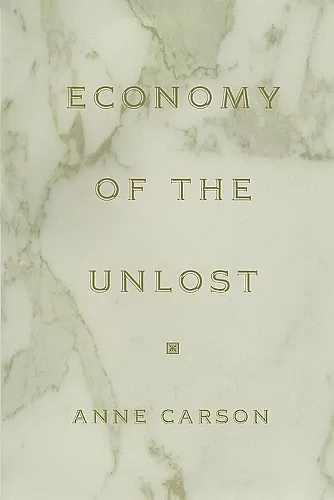Economy of the Unlost
(Reading Simonides of Keos with Paul Celan)
Format:Paperback
Publisher:Princeton University Press
Published:28th Mar '02
Should be back in stock very soon

This insightful work connects the ancient poet Simonides with modern poet Paul Celan, exploring themes of language, loss, and poetic economy.
In Economy of the Unlost, Anne Carson embarks on a profound exploration of poetic economy by examining the works of Simonides of Keos and Paul Celan. The ancient Greek poet Simonides was notable for being the first in the Western tradition to accept payment for his poetry, a practice that invites critical reflection on the value of words. Carson poses essential questions: What is lost when words are wasted? Who benefits when words are preserved? Through these inquiries, she uncovers striking parallels between the two poets, each navigating their own unique historical and cultural landscapes.
The book begins by framing Simonides and Celan as figures caught between two worlds. Simonides faced the transition from a gift economy to one driven by monetary exchange, while Celan, a Holocaust survivor, grappled with the dislocation of language in post-war Europe. Carson’s analysis extends to the genre of the epitaph, revealing how both poets articulate the relationship between the living and the dead. She thoughtfully examines how the physicality of inscription influenced Simonides' concise style, drawing a comparison to Celan’s focus on the 'negative design' of printmaking, where each poet adeptly eliminates the superfluous.
Ultimately, Economy of the Unlost serves as a rich tapestry of scholarship and poetry, illuminating the contrasts and connections between Simonides' faith in language and Celan's despair. Carson's unique voice, blending rigorous academic analysis with poetic sensibility, makes this work a compelling read that resonates deeply with themes of loss, memory, and the enduring power of words.
"Erudite and entertaining, effortlessly able to play across a range of associations, the book traces a number of similarities in artistic approach between two writers who would seem, on the face of it, to have inhabited very different worlds ... Economy of the Unlost is a beguiling piece of work, both scholarly and persuasive."--Elizabeth Lowry, London Review of Books "This is one of those rewarding, original, rigorously attentive books that only Anne Carson could have written. At its core is an idea-the way the overlapping senses of 'economy' play out in language and in monetary history-that only this brilliant poet/classicist could have come up with. Economy of the Unlost is a strange book, bringing together as it does Simonides and Paul Celan; but its strangeness is one of its great virtues, for startling insights spring uncannily off every page."--Wendy Lesser, Editor, The Threepenny Review "[A] magnificent and lovely essay... I never wanted [the] book to end. .. ."--Stanley Corngold, Modernism/Modernity "[Carson] convincingly draws out the fraternity of tone and inclination in two poets far removed in time, experience, and language, a significant accomplishment. It is...difficult to do full justice to her book--rich, delicate, and complex... An act of grace."--Danielle Allen, Chicago Review
ISBN: 9780691091754
Dimensions: unknown
Weight: 227g
160 pages